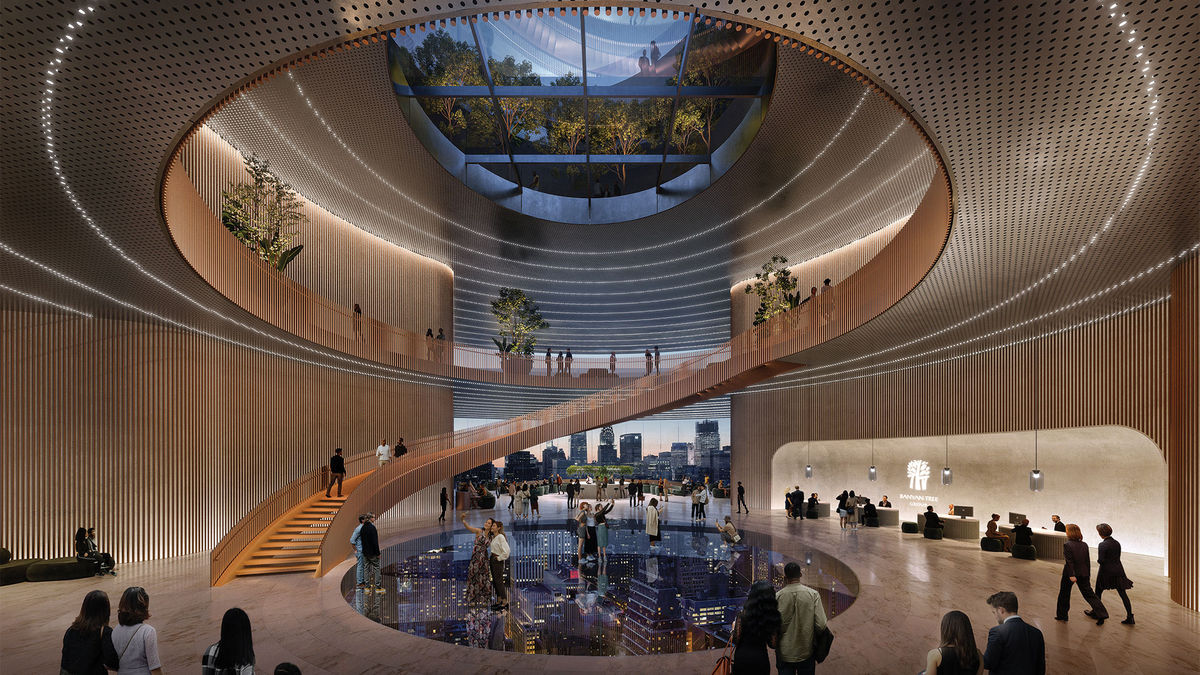The competition to nab a highly coveted license to operate a casino in New York City is heating up, and as new names enter the fray, it’s likely to get even hotter.
The high-stakes frenzy kicked off in April 2022 when three new casino licenses for downstate New York, which includes the city and surrounding counties, made their way into the state’s budget.
Two years later, the fact that the New York State Gaming Commission has not begun processing license applications has not stopped major players in gaming, hospitality and real estate from publicizing their proposals and getting a head start on lobbying efforts.
The latest hospitality company to throw its hat into the ring is Banyan Group, parent company of Banyan Tree and other hotel brands, which joined a bid being put together by gaming industry veteran Mohegan and developer Soloviev Group.
The trio’s proposed project, on midtown Manhattan’s east side, is a six-acre, mixed-use complex near the United Nations called Freedom Plaza. The proposal includes a 280,000-square-foot gaming area; 30 restaurants, bars and lounges; and two hotels, including a 1,000-room property flagged by Mohegan and a higher-end, 250-room Banyan Tree.
For Banyan Group, the Banyan Tree at Freedom Plaza would be the company’s first property in the U.S.
Headquartered in Singapore, Banyan Group has 76 hotels across more than 20 countries, mostly in the Asia-Pacific region.
The proposed Freedom Plaza complex would be on the east side of Manhattan. Photo Credit: Banyan Group/Mohegan/Soloviev Group
“The [desire to] enter into the U.S. has been particularly strong for us over the last 18 months or so, and when we heard about this opportunity in New York, it was immediately a green light for us,” said Gabriel Gn, Banyan Group’s senior assistant vice president and head of business development. “We’re very excited, and if we can be a part of this, it’ll be a huge opportunity.”
The New York property wouldn’t be the company’s first to exist alongside a gaming concept. Banyan Group opened the Banyan Tree Macau as part of the Galaxy Macau casino-resort complex in 2011.
“It has been wildly successful,” Gn said of the Macau hotel. “Within casino clientele, there’s a select group of very high-end customers who do expect something pretty amazing when it comes to the hotel they stay in, and we’ve been able to create that for them. And we think we can do that [in New York], as well.”
Gn said the proposed New York property would be a luxe “oasis,” with wellness programming a top priority and select suites offering Banyan Tree’s signature in-room relaxation pools. “We’ll almost be bringing a resort villa experience into an urban environment,” Gn said.
Wynn, Caesars and others
Banyan Tree, Mohegan and Soloviev Group aren’t the only big names vying to bring a gaming and hospitality hub to New York.
In 2022, Wynn Resorts and developer Related Companies announced plans to pursue one of the three casino licenses, with a plan to bring a Wynn gaming resort to Midtown West’s Hudson Yards neighborhood. Caesars Entertainment and SL Green Realty Corp. also partnered on a bid, with their plan involving the opening of a Caesars Palace resort casino in the heart of Times Square.
Likewise, Hard Rock International linked up with New York Mets owner Steve Cohen to propose Metropolitan Park, a 50-acre “sports and entertainment park” with a Hard Rock gaming and hospitality venue adjacent to the Citi Field baseball stadium in Queens.
Other gaming giants set their sights just outside the city: Las Vegas Sands aspires to bring an entertainment and casino project to Long Island’s Nassau County. And two big gaming players already in the region want to build on what they have: MGM Resorts International hopes to secure a license to expand Empire City Casino in Yonkers, N.Y., transforming it into the MGM Empire City, while Genting Group is chasing a license to expand and renovate the Resorts World New York City casino in Queens.
How would gambling affect New York tourism?
Industry experts say the introduction of major gaming, hospitality and entertainment hubs could shake up the greater New York tourism ecosystem.
Sean Hennessey, assistant professor at New York University’s Jonathan M. Tisch Center of Hospitality, said casino gaming would spur additional travel to the New York area as an attractive “bolt-on” to a visit. A robust New York casino scene could siphon demand from nearby gaming destinations Atlantic City and Connecticut, he added.
A question, Hennessey said, is whether the average New York gambler will skew high-end enough, since casino gaming is usually accompanied by a lower-cost trip.
“While the upscale gaming customer has emerged, there is still a lot of midmarket gambling demand,” he said. “That would be harder for New York City to pull off, since the development and operating costs of tourist facilities are much higher than other locales.”
Still, the economic impact of these casinos is expected to be widespread.
Kimberly Otis, associate professor for the School of Hotel, Culinary Arts and Tourism at SUNY Schenectady County Community College, said the state’s tax structure on casinos makes it eligible to receive “significant money” from these projects, which she also said are known for their capacity to create jobs.
Otis also acknowledged that with casinos come potential drawbacks, including impacts related to problem gambling.
“Casinos are a form of entertainment, but it’s also a conflicted industry, and there are many people who can become negatively impacted by casino facilities,” she said. “That being said, there are casinos that are run beautifully and that have a great awareness of responsible gaming applications, and I think that will be important.”










